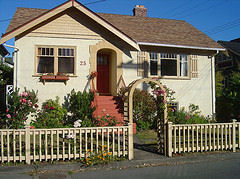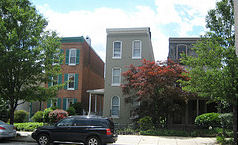 |
| Attract Potential Buyers to Your House with Curb Appeal |
Curb
appeal refers to what house-hunters first see when they visit your
home, or even as they drive through neighborhoods browsing "For Sale"
signs. When someone is considering your house as their new home,
first impressions count - make sure it's a good one with these tips:
De-clutter your yard by
removing anything that doesn't serve a practical or decorative purpose.
Gather children's toys, remnants of your last gardening project, and
any other items that don't belong, and place them out of sight. A
cluttered front yard may lead passersby to think the inside of your
home is equally unkempt.
 Tidy
up your yard by making sure the
lawn stays well-manicured. Mow it often, and trim shrubs and trees that
may have become overgrown, especially if they get in the way of a full
view of your house. Add mulch to your flower beds for a budget-friendly
method of freshening up your yard. You might even add some colorful
annuals to brighten things up. Tidy
up your yard by making sure the
lawn stays well-manicured. Mow it often, and trim shrubs and trees that
may have become overgrown, especially if they get in the way of a full
view of your house. Add mulch to your flower beds for a budget-friendly
method of freshening up your yard. You might even add some colorful
annuals to brighten things up.
Try to look at your house
objectively. If your door is painted a bright color that may not appeal
to most potential buyers, consider painting it a more neutral color. Or,
if a few spindles on your front porch are missing, replace them.
Simple, budget-friendly alterations can really make a difference in
making your house look inviting and appealing to potential buyers.
|
|
 |
| How to Choose a Contractor for Home Repairs |
 When you purchase a house, a contingency of the contract may be an
allotment for certain home repairs and updates, negotiated by the
former homeowner and the new one. Depending on the services you
require, you may need to hire a plumber, electrician, or some other
contractor. To ensure you get high-quality work for a reasonable
price, you'll want to do your homework and find an experienced and bonded
contractor. Ideally, ask a friend, coworker, or a new neighbor for a
referral. Ask what kind of project the contractor completed, and if the
price and amount of time it took to complete the project was
reasonable. Getting a referral from someone you know will make it more
likely that you will get a truthful and candid recommendation. When you purchase a house, a contingency of the contract may be an
allotment for certain home repairs and updates, negotiated by the
former homeowner and the new one. Depending on the services you
require, you may need to hire a plumber, electrician, or some other
contractor. To ensure you get high-quality work for a reasonable
price, you'll want to do your homework and find an experienced and bonded
contractor. Ideally, ask a friend, coworker, or a new neighbor for a
referral. Ask what kind of project the contractor completed, and if the
price and amount of time it took to complete the project was
reasonable. Getting a referral from someone you know will make it more
likely that you will get a truthful and candid recommendation.
If you don't
have someone who can provide a referral, start by searching the phone
book for contractors from larger, more established companies. Chances
are that if they've been in business for more than a few years, their
work is quality. But just to be on the safe side, after you've narrowed
down a few choices, consult the local chapter of the Better Business
Bureau or the Chamber of Commerce to see if any complaints or issues
have been filed against the companies you're considering.
When
you choose a company to work with, it's reasonable to ask for a list of
references or examples of past projects. You may also verify the
business's insurance coverage and work permits. After all, they will
be in your home -- so take the precautions you need to ensure you've made a
well-informed decision. Finally, a deposit may be required to begin
work, but you shouldn't be expected to pay the balance on services
until the project is complete.
|
|
|
|
 |
| Depersonalize Your Home to Encourage Potential Buyers |
 When prospective buyers tour your home, they need to be able to imagine
themselves living in it. However, this can be a challenge when your
family photos adorn the walls, your books clutter the shelves, and your
personal effects are prominently displayed throughout the house.
Depersonalizing your home makes it a clean slate to potential buyers,
allowing them to imagine their own belongings in the spaces left
behind. It may be difficult to disassemble the way your home has looked
for years, but it will prove beneficial in helping to sell your house
as quickly as possible. When prospective buyers tour your home, they need to be able to imagine
themselves living in it. However, this can be a challenge when your
family photos adorn the walls, your books clutter the shelves, and your
personal effects are prominently displayed throughout the house.
Depersonalizing your home makes it a clean slate to potential buyers,
allowing them to imagine their own belongings in the spaces left
behind. It may be difficult to disassemble the way your home has looked
for years, but it will prove beneficial in helping to sell your house
as quickly as possible.
The most common source of
personalization in a home is photos. Remove photos of families and
friends throughout the house. Other
decorative objects that personalize a home include: artwork (think
painted family portraits and hand prints of children), diplomas, and
collectibles (porcelain dolls, sports memorabilia, unusual trinkets,
etc.) After depersonalizing your home, if you feel it looks too
barren, consider purchasing some inexpensive, neutral decorations like
generic artwork and vases filled with fresh flowers.
The
key in depersonalizing your home is presenting it as a blank canvas to
potential buyers. Attract them to purchase your home by not bombarding
them with your personal furnishings and adornments.
For more ideas about how to depersonalize your home, you may consider
consulting a Certified Staging Professional or asking your agent for
tips.
|
|
 |
| Finding and Choosing a Foreclosure Property |
 Today foreclosure properties abound, and with the convenience of the
internet, you can find foreclosure properties right from your computer
by searching sites that feature foreclosure listings. Several sites, like
the Fannie Mae-Owned Property Search, HUD Homes, and the IRS Real Estate
and Personal Property Search, allow people
to search foreclosure properties by location, price, and type of property. Besides internet
searches, however, there are many unique approaches to finding a house
in foreclosure, or finding homeowners that are seeking a quick sale to avoid
foreclosure. Today foreclosure properties abound, and with the convenience of the
internet, you can find foreclosure properties right from your computer
by searching sites that feature foreclosure listings. Several sites, like
the Fannie Mae-Owned Property Search, HUD Homes, and the IRS Real Estate
and Personal Property Search, allow people
to search foreclosure properties by location, price, and type of property. Besides internet
searches, however, there are many unique approaches to finding a house
in foreclosure, or finding homeowners that are seeking a quick sale to avoid
foreclosure.
To find foreclosed houses or those in danger of
being foreclosed, check the newspaper. House listings that are marked
"for sale by owner" (may be abbreviated "FSBO"), "reduced for quick
sale," or "motivated seller" may indicate the homeowners are desperate
to get out from under their mortgage payments. You may also try driving
through local neighborhoods and looking for houses that appear unkempt,
uninhabited, or just generally in disrepair. If a lawn looks like it
hasn't been mowed in weeks or the house's paint is peeling, it could be
a sign the homeowner doesn't have the money or the means to continue
maintaining their home and may sell it to you at a big savings.
You've
probably seen billboards that say something to the effect of "We buy
houses" around your city. In a similar fashion, consider taking an ad
out in your local paper or the area where you'd like to purchase a home
with your contact information, and a foreclosed property may come to
you!
|
|
 |
#my_firstname# #my_lastname#
#my_phone#
|
|
|
 |
|
In This Issue:
|
|
 |
|
Contact me:
|
#my_firstname# #my_lastname#
#my_phone#
|

|
|
Tips for Buying Forclosure Property
|
|

|

|
|
Open House Tips - Fine Living Network
|
|

|

|
|
Choosing the Right Neighborhood
|
|

Depending
on your needs and interests, some neighborhoods are better
than others, and this is an important consideration when shopping for
your next home. Here are some things to keep in mind when evaluating
neighborhoods:
Schools-
If you have children or are planning to in the near future, the
proximity and success of the nearest school should be a consideration
in choosing a neighborhood. Realtors usually provide this information
as part of a property's extended real estate listing. Depending on your
lifestyle and needs, consider the proximity of other locations like
your job, cultural venues (theatres, museums, movie theatres,
amphitheaters), airports, malls, hospitals, parks, and stadiums.
Property
value- Research the average price of houses in the prospective
neighborhood. The higher the value of the homes around yours, the more
your house will be worth, especially if the neighborhood becomes a
highly sought-after, "hot neighborhood" in later years.
Crime
rate- Has it been rising each year in a particular area or is it on the
decline? A diminishing crime rate is obviously more favorable than one
continually on the rise.
Traffic- How much time should you
allocate each day for traffic during your morning and evening commute?
Purchasing a home in a neighborhood outside of a city could save you a
lot of money, but the extra time spent commuting isn't an adequate
trade-off for some buyers.

Community involvement- If community
involvement is important to you, check and see if there is an active
Homeowners' Association in your neighborhood. HOAs generally host
events and sponsor projects in the community that encourage neighbors
to get know one another. Here's a tip: Try driving through the
community on a Saturday afternoon to see how many neighbors are in
their yards, if neighborhood children appear to be playing together,
etc. You could always conduct an impromptu interview, asking a
potential neighbor how they like living in the neighborhood.
|
|
 |